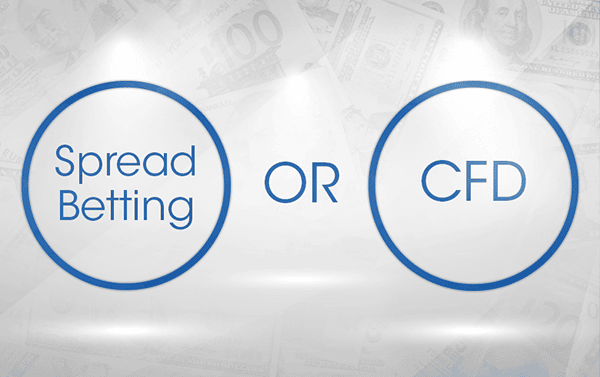Spread Betting and CFDs are complex instruments and come with a high risk of losing money rapidly due to leverage. 71.8% of retail investor accounts lose money when trading Spread Betting and CFDs with this provider. You should consider whether you understand how Spread Betting and CFDs work and whether you can afford to take the high risk of losing your money
What is cfd and spread betting?
What's the difference between spread betting and cfds trading accounts?
Spread betting vs contracts for difference? Which one best suits depends on your personal circumstances.
Whilst Spread betting and Contracts for Difference share a number of common features, they have some key differences too.
If you are new to trading then the first thing you need to decide is what sort of account would suit you best. But even if you have traded before, it’s worth making sure that you’re using the right account by understanding the differences between them. At Spread Co we offer two main types: spread betting and CFD, or Contract for Differences. In many ways the two account types are similar. However, there are some fundamental differences between spread bet and CFD accounts which you should consider before deciding which one to choose. How you decide will depend on your answers to a couple of questions:
Does the difference matter on where I live?
So, if you live outside the UK, it could be that you are ineligible for a spread betting account. In which case, it’s time to consider CFD trading. But if you reside in the UK, it may still be the case that CFD trading is a better option, depending on how active you are as a trader.

– Restricted availability according to country of residence
– Exempt from Capital Gains Tax and Stamp Duty*
– Eliminate currency risk – choose a base currency for your account
– Simple – bet in £, $ or € per point
– Mini markets available
– Widespread availability globally
– Exempt from Stamp Duty*
– Profits and losses realised in underlying currency of instrument
– Trade in CFDs per point
At a glance
| Spread Betting | CFDs | |
|---|---|---|
| Range of markets | Indices, Equities, Commodities, FX, ETFs, ADRs | Indices, Equities, Commodities, FX, ETFs, ADRs |
| Commission | No additional commission will be charged to your account, everything is in the spread. | No additional commission will be charged to your account, everything is in the spread. |
| Minimum trade | £1 per point | Indices: 1 CFD Equities: Varies – from 1 CFD Commodities: Varies – from 10 CFDs FX: 10,000 CFDs |
| Platforms | Mobile, tablet, web | Mobile, tablet, web |
| Risk management | Stop loss, limit order | Stop loss, limit order |
| Demo account | Yes | Yes |
| Stamp duty | No1 | No1 |
| 24 hour dealing | Yes | Yes |
| Capital Gains Tax on profits | No1 | Yes |
Currency risk
Spread betting is the most straightforward way to speculate on financial markets. A major reason for this is that you can choose the currency in which you spread bet. At Spread Co, our customers can choose to spread bet in sterling, euros or US dollars, so all profits and losses are realised in the currency of your choice. This is not the case with CFDs.
With CFDs profits and losses are made in a variety of different currencies, depending on which currency the underlying financial instrument is priced. For instance, in global markets gold, silver and most other commodities are priced in US dollars while the Japan225 future and the USDJPY currency cross are both priced in Japanese yen. So if trading CFDs on gold, your profits or losses are realised in US dollars. Likewise, profits and losses on the Japan225 future and USDJPY are realised in Japanese yen. Any realised profits or losses are then converted overnight to your preferred account currency of British pounds, US dollars or euros.
CFDs and spread bets allow you to speculate on price movements of financial instruments, whether up or down. You never own the underlying product and instead you trade on margin. That is, rather than paying the full value of the underlying contract, you put up a proportion of its value which gives you control over a larger amount of it. This is quite different from buying shares of a company through a broker. Example:
Let’s say that BP shares are trading at £5.52
If you bought 1,000 shares through your broker this would cost you £5,520 (excluding commissions and other charges)
Our margin requirement for major UK shares both spread bets and CFDs is 20%. Consequently, the equivalent £10 per penny spread bet or 10 CFD per penny trades both require an initial margin of £1,104 (5,520 x 20%)
As you can see, CFD trading and spread betting allow you to speculate on price movements on financial instruments by putting up a modest percentage of the overall underlying value as initial margin. It is important to understand the risks involved as you may lose more than your initial margin if prices move against you. This type of speculation is not suitable for everyone. Please seek independent advice if in any doubt about the suitability of these products.
Key differences
| Spread Betting | CFDs | |
|---|---|---|
| Tax on gains1 | No Capital Gains Tax on any profits. | Any losses can be offset against other gains for Capital Gains Tax. |
| Offset losses* | You can’t offset any losses against gains made elsewhere. | Any losses can be offset against other gains for Capital Gains Tax. |

Easy To Open An Account
Reliable Platform
With our platforms you can trade wherever you are – at home, in the office, or when you’re out and about.
0% financing on short index positions
Some companies will charge you to hold a short index position. At Spread Co we won’t.
Powerful Charting
Spread Co charts are powered by TradingView Inc.
Sign Up For A Demo Account Create A Live AccountStart here
Markets
Spread Co Limited is a limited liability company registered in England and Wales with its registered office at 22 Bruton Street, London W1J 6QE. Company No. 05614477. Spread Co Limited is authorised and regulated by the Financial Conduct Authority. Register No. 446677.